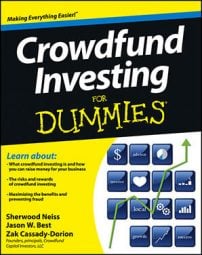When the subject is crowdfund investing, you need to ask yourself why you’re investing in the first place. What are your end goals? What is your time horizon? Do you need to earn a certain percentage on your investments within a year? Five years? Twenty years?
“Begin with the end in mind.” This truism holds for many aspects of life. It speaks to the need to plan what you want to achieve before you take action. How can you know when you’ve succeeded if you haven’t decided what success looks like?
Consider these questions:
Are you looking for a quick gain? If so, crowdfunding investing is not for you. In addition to the legislated 12-month holding period for equity crowdfund investments, these types of investments are less liquid (meaning very likely more difficult to sell) than more traditional investments.
Unlike with a mutual fund or a public company stock, you can’t necessarily count on being able to sell a crowdfund investment on the exact date you determine would be best for your goals.
Are you looking to hold and then sell in the two- to five-year time frame? Maybe you’d like to help a company get started, and then you want to find a way to sell your shares. This outcome is permitted by the law and seems very possible.
Nothing is guaranteed, but you should be able to find buyers for your shares (especially if the company is performing well and meeting its goals).
Are you expecting the company you invest in to have a huge initial public offering (IPO) that will turn your shares into gold? Reality check: Of all the possible outcomes for your shares, an IPO is the least likely. Only a tiny fraction of companies ever make it to an IPO. The process of turning a private company into a publicly held company is very expensive; the IPO itself costs a bundle, and the ongoing regulatory compliance measures are very costly as well.
Consider the likelihood of an IPO happening to be akin to the likelihood of your being struck by lightning. Yes, it does happen on rare occasions, but chances are, it won’t happen to you in your lifetime.
Are you buying the shares for a mixture of reasons? Are you investing in your community via crowdfund investing, and are you looking for a nontraditional exit? Are you willing to take some form of dividends from a community-based business instead of getting a big payout by selling your shares?
Maybe you’re making a crowdfund investment decision because the business is right for your community. For example, maybe you live in a small town that needs a grocery store, and the community gets together to raise money to get it started. Will you see a huge financial windfall in a handful of years from this type of investment? Probably not.
But will you be able to get milk, eggs, bread, and vegetables when you need them without having to drive 30 miles to the next larger town? Yes . . . and that has real value for you and your community. In very real ways, you’ll benefit every day from this type of investment.
Whatever your desired or planned outcome is, make sure you’re clear about it at the beginning. That way, you’ll be more likely to feel at peace with the actual outcome because you understand not only what you want but also how likely that desired result may be.

